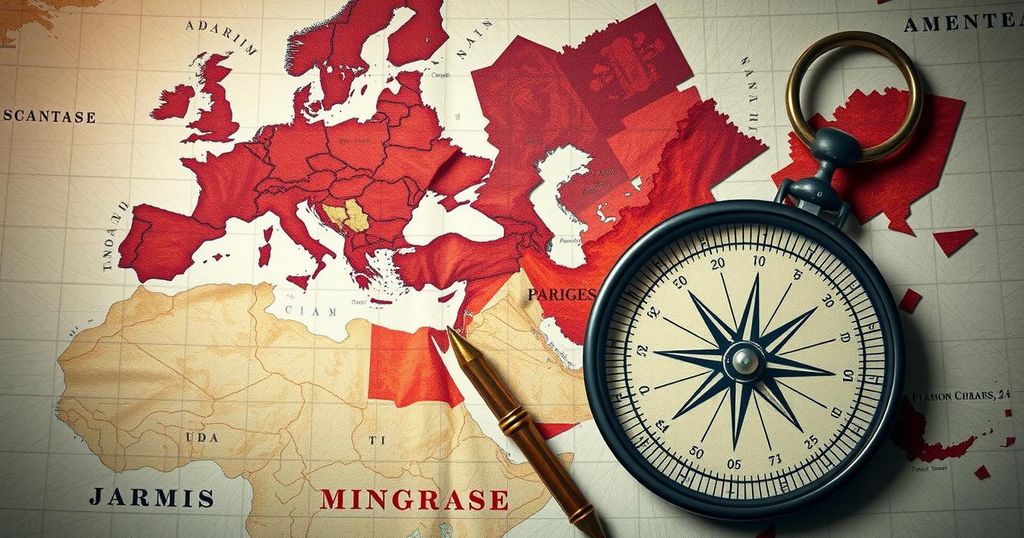President Trump’s proposal to forcibly relocate Palestinians from Gaza has sparked outrage and resistance from various countries, including Egypt and Jordan. The plan is widely perceived as a potential act of ethnic cleansing undermining Palestinian autonomy and identity. Regional leaders, including Saudi Arabia, have firmly rejected it, emphasizing the necessity for establishing a Palestinian state before advancing ties with Israel. The proposal also complicates the fragile ceasefire in Gaza and the ongoing efforts to resolve hostage situations.
President Donald Trump’s plan to forcibly relocate hundreds of thousands of Palestinians from Gaza to transform the area into a tourist destination has generated significant controversy. Critics, including Palestinians and regional leaders, view this as a form of ethnic cleansing aimed at erasing their longstanding claim for a state.
The proposal has faced strong condemnation from Arab nations such as Egypt and Jordan, which are close U.S. allies and maintain peace agreements with Israel. These countries have rejected suggestions to accommodate more Palestinian refugees, fearing it would undermine their national stability and security.
Saudi Arabia has unequivocally rejected Trump’s transfer plan, affirming it will not advance relations with Israel unless a Palestinian state is established, including East Jerusalem as its capital. The kingdom stated its position is non-negotiable and not subject to compromise.
Additionally, the proposal threatens to destabilize the current ceasefire in Gaza and complicate the negotiation of hostages taken during Hamas’ recent attacks. While Trump claims credit for brokering a truce, the future of peace in the region seems increasingly uncertain.
The Palestinians view Gaza as an essential part of their homeland, with many being descendants of refugees displaced during the 1948 war surrounding Israel’s establishment. The centrality of land rights and the desire to remain on their ancestral territory remains a core aspect of Palestinian identity.
Both Hamas and the Palestinian Authority have strongly condemned the proposed transfer, as have regional governments. Egypt and Jordan have historically rejected resettlement proposals for Palestinians, fearing that Israel would refuse to allow their return.
While Trump suggested that wealthy Gulf states might finance Palestinian resettlement, this idea has been met with skepticism, as these nations have also expressed disapproval of such plans. The complex socio-economic impacts on Egypt and Jordan, which cannot afford a sudden influx of refugees, further complicate the situation.
Egypt has voiced concerns that relocating Palestinians to its Sinai Peninsula could jeopardize its peace treaty with Israel, a critical foundation of regional geopolitical stability. Furthermore, Egypt and Qatar are involved in peace negotiations and were integral to the recent ceasefire.
Despite some Israeli leaders considering Trump’s unconventional ideas, there remains widespread reluctance among mainstream politicians. Prime Minister Benjamin Netanyahu acknowledged the shock value of Trump’s proposals but noted that they warrant consideration, while others emphasize prioritizing the release of hostages over discussing broader plans.
Trump’s approach to negotiations includes leveraging economic pressure on nations reliant on American aid. However, both Egypt and Jordan possess their own strategies to counter perceived threats to their national security from Trump’s proposals.
The context surrounding President Trump’s Gaza plan stems from ongoing tensions between Palestinians and Israel, particularly after the recent military conflicts which have deeply affected Gaza. Previous proposals aimed at resolving the Israel-Palestine conflict have encountered obstacles, and Trump’s plan is viewed as a reaction to long-standing issues related to displacement and statehood ambitions among Palestinians. The historical significance of Gaza and its population’s roots complicate the acceptance of any drastic measures like forced relocation, evoking fears of ethnic cleansing and loss of identity.
In conclusion, Trump’s Gaza plan faces overwhelming challenges due to its controversial nature and the regional implications it carries. The opposition from Palestinian leaders, Arab nations, and the broader international community highlights the inherent difficulties in resettlement proposals, signifying the complexity of achieving peace in the region. The ongoing dynamics suggest that achieving a sustainable resolution will require deeper negotiations and collaboration among key stakeholders.
Original Source: abcnews.go.com






